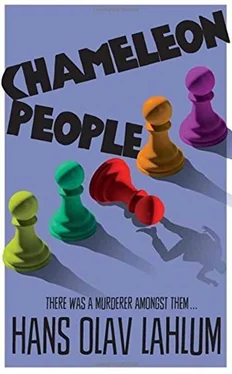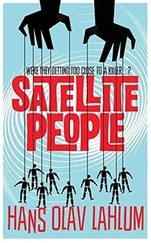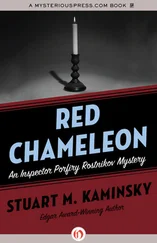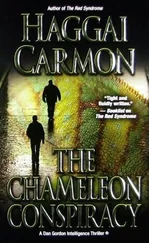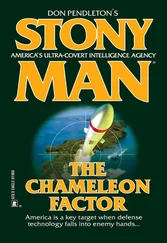My boss and I had barely opened the door before Ragna Bratten slipped in past us. I wondered how much she would be told about this strictly confidential case – and how such different people could function together in a marriage. But then I had more than enough problems of my own to think about.
My boss and I left the prime minister’s office in silent thought at five to five. Fifteen minutes later we presented ourselves, still grave and thoughtful, at the reception of the Soviet Embassy in Drammen Road.
The receptionist at the Soviet Embassy was a raven-haired man somewhere between thirty and fifty, who, with his stony face and grey suit, looked just as I had expected a receptionist at the Soviet Embassy to look. His expression did not change in the slightest when we introduced ourselves. He then picked up the internal telephone and relayed a short message in Russian.
We stood waiting for three minutes, until another member of staff, who looked like the first’s big brother, appeared. After a brief handshake, he said: ‘Please, follow me.’
The atmosphere was not conducive to small talk. We followed him along a dark hallway into a large meeting room with four chairs positioned around a big table set with cake, water and vodka. The member of staff pointed at the two chairs closest to the door, said ‘Wait here’, and then left the room. So there we sat under a five-foot portrait of the Soviet Union’s leader, Leonid Brezhnev. He looked condescendingly down at us, his chest covered in orders and medals.
‘Not a promising start,’ I said to my boss in a hushed voice, once we were alone in the room. He instantly raised a warning finger to his mouth. I realized my mistake and showed my palms in acknowledgement. There was no reason to believe that the room was not bugged.
Just then, there was a light knock on the door. This pre-empted a pleasant surprise. In walked a dark-haired, slim and attractive woman in her twenties.
She gave us a timid little smile, shook our hands with an unexpected firmness, and said in perfect Norwegian: ‘Welcome. My name is Tatiana Rodionova and I will be the interpreter for your meeting with the vice-ambassador, Igor Sokolov. The vice-ambassador is unfortunately currently caught up in another important meeting, but should be here shortly.’
I was instantly charmed and I remarked that she spoke impressively good Norwegian.
Her smile widened and she replied: ‘Thank you, it is a very interesting and beautiful language. I have a PhD from Moscow University. I have only been here for three months, but have given some guest lectures in Russian and been to a few lectures in Norwegian at the university here in Oslo.’
It all started so promisingly. But that all changed when the door opened again, this time without a warning knock. It then slammed closed behind a six-foot-five bald man in his fifties wearing a double-breasted black suit and patent leather shoes. He was the tallest man I had ever met, as far as I could remember, and possibly also one of the heaviest. His build and body language made me feel as though I was standing in front of the great Russian bear, a feeling that was in no way diminished by his unusually powerful handshake.
Vice-Ambassador Igor Sokolov’s arrival changed the atmosphere in the room completely. All of a sudden my boss and the interpreter were serious and focused. Sokolov spoke fast and in bursts like a machine gun. The interpreter’s voice was flat and serious as she translated.
‘The vice-ambassador would like to welcome you and he thanks you for coming at such short notice. The embassy is aware that the investigation into the tragic murder of a leading Norwegian politician, Mr Per Johan Fredriksen, is still ongoing. This is of course an internal, Norwegian case in which the embassy does not wish to become involved. The embassy is, however, concerned that one of the biggest Norwegian newspapers is planning to make public some unfounded rumours that Fredriksen had improper contact with the embassy here and that this may have been the reason why he was killed.’
This was unexpected. My boss and I exchanged a swift glance, without becoming any the wiser. It was unnerving that the Soviet Embassy had better knowledge than we did of what the Norwegian media planned to write about an ongoing criminal investigation. But more than anything, it would be very uncomfortable for us if such speculations were published in the newspapers.
The vice-ambassador did not give us long to think before unleashing a new volley of verbal gunfire.
‘Normally, the ambassador would have taken the matter very seriously, but given the timing, he now finds it particularly pressing. We cannot see any explanation other than that enemies of the Soviet state, by means of these evil rumours, are attempting to block an agreement that is of great national importance to the Norwegian state as well.’
The vice-ambassador’s face was grim, the voice of the translator staccato, and I myself thoughtful. I looked over at my boss. He coughed and said: ‘We were not aware that some of the press were planning to publish such reports. We have a free press in Norway that cannot be overruled by the police or politicians. What does the embassy wish us to do?’
The response was rapid. ‘We want the Verdens Gang newspaper to be given the necessary instructions to stop that report being published tomorrow. Alternatively, as soon as the reports are published, the press and politicians could be informed immediately that the reports are completely unfounded. Unless, of course, the police are sitting on evidence that gives grounds for such suspicions. In which case, the embassy should have been contacted long ago in order to clear up any misunderstandings and to disprove such allegations.’
The situation felt more and more tense. We had no evidence to give the embassy, but equally could not rule out any contact. My boss looked at me questioningly. It felt like I was jumping into an ice-cold lake when I took the plunge and started to speak.
‘In an open democracy such as Norway, the police cannot instruct the free press on what they can and cannot write. We will of course follow all press coverage closely and assess the need to make a statement, should any of the reports tomorrow be misleading with regard to the situation. We do not believe that the murder of Fredriksen was in any way linked to the Soviet Union. The problem is that in a constitutional state such as Norway it is difficult for the police to make a categorical statement about who has not committed a crime as long as the investigation is ongoing and we have not arrested anyone for the murder.’
I felt my pulse rising as the interpreter translated my answer into Russian, in a slightly less staccato voice. Behind his iron mask, Igor Sokolov was clearly either very well prepared or a very intelligent man. He replied within seconds of the interpreter finishing her translation.
‘The vice-ambassador finds it surprising that it is difficult to make such a statement, unless the police themselves also doubt the Soviet state’s good intentions. He is also surprised that the investigation has not yet resulted in an arrest almost one week after the murder.’
I looked at my boss, and when he did not answer, did so myself.
‘The police do not, of course, doubt the Soviet state’s intentions in any way, but the investigation is complex and we are duty-bound to keep all possibilities open. As I said, we will assess the need for a statement as soon as we see what is in the papers tomorrow morning. There are a couple of things that we think may have contributed to these rumours, which, now that we are here, it seems natural to raise. The first is that, on several occasions, Fredriksen was seen having long conversations with representatives from the embassy.’
Читать дальше
